Mycotoxins Enormous Detrimental Effect on Your Health
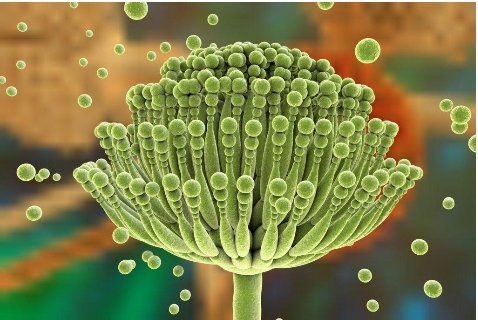
Mycotoxins can have enormous detrimental effect on the human body, in particular because they are very good at impairing the immune system. They can either cause an overwhelming immune activation (autoimmunity) or an immune deficiency. Mycotoxins are extremely prevalent and can provoke a huge spectrum of illnesses. The concept of toxins, toxicity, toxic overload and mycotoxins is very much dismissed in the conventional medicine. As a result, manifestations of mold-related illness often remain misdiagnosed and ineffectually treated.
In my functional medicine practice, I frequently identify mycotoxins as a one of root causes and contributing factors in a wide range of physiological imbalances and disease dynamics that I work with clients to address and reverse.
What are MYCOTOXINS?
Mycotoxins are compounds produced by mold and fungi that can be very toxic to the living organisms. Mycotoxins exhibit systemic problems. These toxic substances may cause different types of poisoning and, consequently, diverse health problems (from acute to chronic problems) in both animals and humans. Mycotoxins are natural contaminants of food and agricultural products all over the world. Humans are constantly exposed to mycotoxins (e.g. aflatoxins, ochratoxins), mainly via food intake of plant and animal origin.
Hundreds of mycotoxins have been identified thus far, such as aflatoxins, ochratoxins, trichothecenes, zearalenone, fumonisins, and patulin. Aflatoxins, fumonisin, and ochratoxin A are human carcinogens.
Aflatoxins for example are extremely toxic secondary metabolites of certain Aspergillus molds which have been classified by the WHO as genotoxic and carcinogenic. When ingested, inhaled, or absorbed through the skin, aflatoxins have carcinogenic, hepatotoxic, teratogenic, and mutagenic effects on human health, even at very low concentrations!
Climatic conditions, pest infestation, and poor harvest and storage practices contribute to presence of mycotoxins in food. Exposure to mycotoxins, which occurs mostly by ingestion, leads to various diseases in the body, including various cancers.
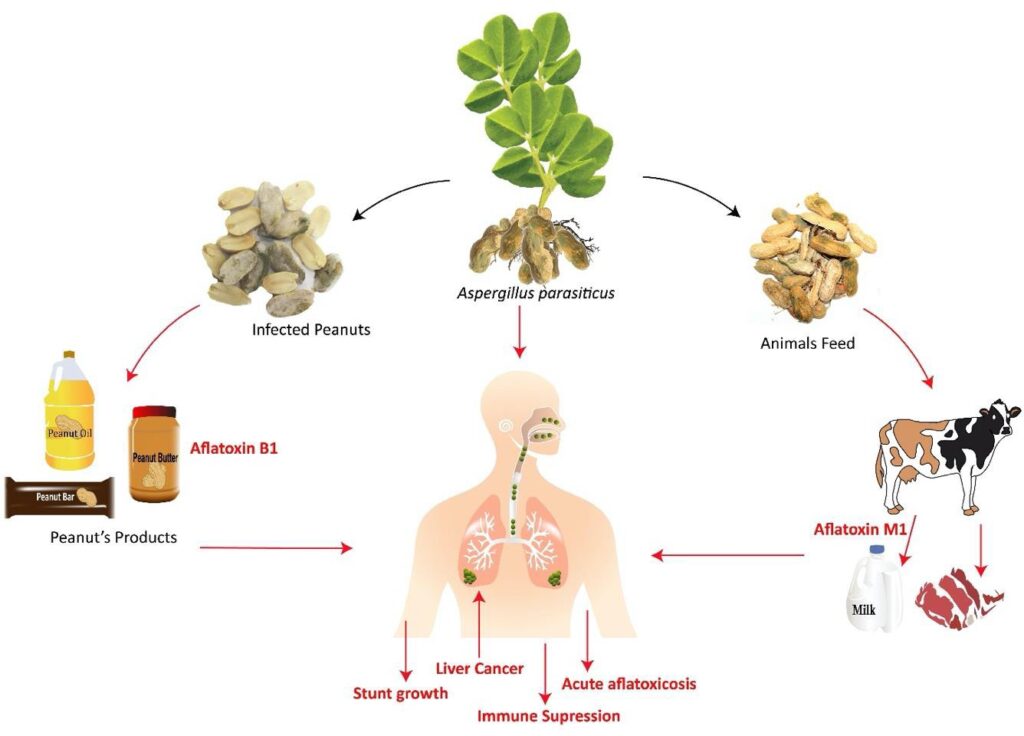
Have You Been Exposed to Mold?
- Do you drink coffee?
- Do you eat peanuts or peanut butter?
- Do you eat grains such as bread, cereal, corn and rice?
- Do you have a front loading washing machine?
- Have you ever had a pipe leak, sink or bathtub overflow, roof leak?
- Do you live in a humid climate?
- Do you live in a warm climate?
- Do you live by the sea, lake or river?
- Have you traveled somewhere tropical?
- Do you struggle with chronic microbial overgrowths, such as Candida, SIBO, or EBV?
- Do you have Lyme disease?
- Have you been diagnosed with the Hashimoto’s thyroiditis?
- Have you gained unexplained weight that you can’t lose?
- Do you have depression, OCD, ADD, ADHD or nervous tics?
- Do you struggle with the mast cell activation syndrome?
- Have you struggled healing your leaky gut?
- Are you reactive to scents, fragrance and/or supplements?
- Did/do you have breast and/or butt implants?
If you answered YES to any of the questions above, chances are that you have been exposed to mold.
Persistence and Impact of Mycotoxins in the Body
Mycotoxins can remain dormant in some for years, while others can get sick immediately. The cumulative burden of chronic stress and environmental challenges—plays a significant role in how symptoms manifest over time.
The symptoms of a mycotoxicosis depend on the type of mycotoxin; the amount and duration of the exposure; the age, health, and sex of the exposed individual; and cumulative synergistic effects involving genetics, dietary status, gut health, quality of sleep and interactions with other toxic insults such as heavy metals. Thus, the disease severity induced by mycotoxins can be compounded by factors such as vitamin deficiency, caloric deprivation, alcohol use/abuse, and infectious disease status. In turn, mycotoxins can heighten vulnerability to microbial diseases, worsen the effects of malnutrition, and interact synergistically with other toxins.
If a mother is exposed to the mold during pregnancy, the fetus absorbs all the toxins, including mycotoxins in order to protect the mom from getting sick. And, if a child is born to a home with mold, they are usually very sick starting at a very young age. Therefore, optimizing your health, addressing any imbalances and reducing any toxic load before getting pregnant will greatly help to optimize your future baby’s health.
Water Damaged Buildings
It is estimated that about 50% of homes in US are water damaged. Mold is especially prevalent in office buildings, college dorms are school classrooms.
Mold can grow within 24-48 hours of a leak in your home. So, if there is any leak it’s important to address it very quickly, so a professional can come in, open up the area and get it dried out promptly and properly.
Even new homes can have hidden mold because the builders may use contaminated with mold spores supplies and products to build brand new homes.
Mold doesn’t have to be visible in order to cause health problems in a unique individual.
Causes of Water Damage in Your Home
- Washing Machine Line Burst
- Frozen Fire Sprinkler
- Toilet Runs and Drips
- Frozen Burst Pipes
- Leaking Air Conditioner
- Leaking Garbage Disposal
- Leaking Water Heater
- Sump Pump Failure
- Drains Quit Draining
- Backed up Sewer Lines
The Main Mycotoxins, the Common Sources and Health Effects
| Mycotoxin | Common Sources | Health Effects |
|---|---|---|
| Aflatoxins B1, B2, G1, G6 | Contaminated grains, nuts, peanuts, corn, Brazil nuts, pistachios, pumpkin seeds, cotton seeds, watermelon seeds | Liver damage and cancer |
| Aflatoxins M1 | Dairy – from animals consuming Aflatoxin B1 contaminated feed | Liver damage and cancer |
| Ochratoxin A | Cereals (corn, barley, wheat, oats), edible animal tissue, raisins, currants, ground ginger, coffee, dried fruits, beer, wine, dried beans | Kidney toxicity and potential carcinogen |
| Trichothecenes | Corn, wheat, barley, oats, rice, rye, safflower seeds | Itching and redness of the skin, sores, shedding of the skin. Loss of the ability to coordinate muscle movement. Nausea, vomiting and diarrhea. Nose and throat pain, discharge from the nose, itching and sneezing. Cough, difficulty breathing, wheezing, chest pain and spitting up blood. Temporary bleeding disorders. |
| Fumonisins | Corn, corn-based products, breakfast cereals | Neural tube defects and esophageal cancer |
| Zearalenone | Corn, corn-based foods, mainly. But, may also be in wheat, barley, sorghum and rye. | Reproductive issues |
| Patulin | Fruits (especially apples and pears), non-fermented fruit juices, grains, and cheese | Nausea, vomiting, diarrhea, lung congestion, epithelial cell degeneration, along with carcinogenic, genotoxic, immunosuppressive, and teratogenic effects |
| Citrinin | Wheat, oat, barley, rice, vegetarian foods colored with Monascus derivatives, and fermented sausage. | Triggers nephropathy and hepatotoxicity as well as renal adenoma formation. |
Systems and Organs Affected by Mold Exposure
Mold and mycotoxins have a systemic affect on the body and can adversely impact various body systems and organs, including:
- Liver
- Kidneys
- Gut
- Brain
- Skin
- Endocrine System
- Immune System
- Respiratory System
- Urinary System
- Cellular Respiration contributing to Mitochondrial Stress
- Altered Brain Chemistry
Common Correlations with Mold Exposure
- Thyroid Dysfunction – mycotoxins impair the metabolic activity of the thyroid gland leading to hypothyroidism and even autoimmune Hashimoto’s activation. I often see many mycotoxins on Mycotoxin lab test on my functional medicine clients with the hypothyroidism and Hashimoto’s thyroiditis.
- Weight Gain and Infertility – certain mycotoxins act as endocrine disruptors and have strong estrogen potentiating activity that can lead to weight gain, inability to lose weight and even infertility problems.
- Skin Issues – citrinin, patulin, aflatoxin B1 and ochratoxin A are known to have the potential to induce dermal toxicity often contributing to itchy skin, rashes, eczema, flaky skin and acne
- Immunosuppression – mycotoxin exposure directly promotes the proliferation of pathogenic microorganisms like parasites; mycotoxins reduce the activity of some specific immune cells and induce immune suppression, resulting in reduced host resistance allowing Candida, bacterial overgrowths and viral activation like Epstein-Barr Virus
- Brain Inflammation – mycotoxins can cross blood-brain barrier, triggering oxidative stress and neuroinflammation, leading to pathogenesis of degenerative brain diseases, including Alzheimer’s disease and Parkinson’s disease.
- Chronic Inflammation – mycotoxins can cause inflammation and oxidative stress throughout the body, leading to a chronic disease often called Chronic Inflammatory Response Syndrome (CIRS). Its symptoms overlap with those of many chronic diseases, such as Mast Cell Activation Syndrome, and chronic infections, such as Borrelia and Lyme disease. Because of immunosuppression, mycotoxins can be drivers for Mast Cell Activation and Lyme disease.
- Mood Imbalances – exposure to mycotoxins has demonstrated positive associations with anxiety, mood, insomnia, cognitive impairments, depression, OCD, ADD/ADHD
- Respiratory Problems – mycotoxins can contribute to asthma, wheezing, bronchitis and nasal congestion
Stand Out Symptoms Associated with Mold
- Frequent Static Shock
- Restless Leg Syndrome
- Nervous Tics
- Frequent Urination at Night
- Bedwetting
- Extremely Sensitive to Supplements
- Hashimoto’s Thyroiditis
- Hypothyroidism
- Eczema
- Chronic Sinus Infections
- Eye Twitches
- Chronic Candida
- Chronic Urinary Tract Infections/ UTIs
- Epstein-Barr Virus
- Small Intestinal Bacterial Overgrowth/ SIBO
- Unexplained Weight Gain
- Inability to Lose Weight
- Outburst, Anxiety, Depression, OCD, ADD/ADHD
Mold & Mycotoxins Create the Perfect Storm
- High Toxic Load – mycotoxins can significantly burden the liver allowing other toxins like heavy metals accumulate in the body. Mycotoxins are associated with the hepatotoxicity, potential liver damage and even cancer.
- Leaky Gut Formation – numerous studies have shown that mycotoxins disrupt the intestinal physical barrier which is one of the pathways for the autoimmune disease activation and immune system dysregulation.
- Reactivation of Latent Infections Due to Mold-Induced Immunosuppression:
- Epstein-Barr Virus (EBV): Associated with mononucleosis and certain autoimmune conditions.
- Lyme Disease: Caused by Borrelia burgdorferi, leading to joint pain and neurological issues.
- Candida Overgrowth: Resulting in fungal infections affecting various body parts.
- Bacterial and Parasitic Infections: Increased susceptibility due to compromised immune defenses.
Diseases Associated with Mold
- Parkinson’s
- Alzheimer’s
- ALS
- Autoimmune Diseases: Hashimoto’s, MS, Lupus, Fibromyalgia, etc
- Cancer
- Infertility
- Hormone Imbalances
- Heart Disease
- ADD/ADHD
- Depression
- Anxiety
Mold is not Detoxified on Its Own
If mold is not properly detoxified, it does not simply resolve on its own. A targeted detoxification protocol specifically designed to eliminate mycotoxins is essential.
While some individuals may experience temporary symptom relief after leaving a mold-contaminated environment, the majority do not.
Unfortunately, there is a common misconception that simply removing oneself from the source of exposure allows the body to heal on its own. While the body is indeed intelligent and resilient, mold is a highly pathogenic toxin that requires strategic support to be fully cleared from the system.
Functional Medicine Testing
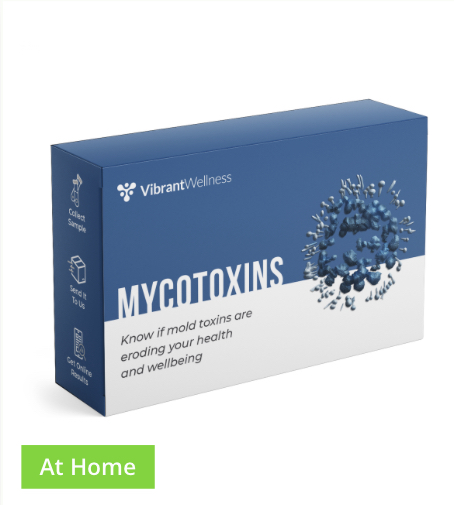
Vibrant Wellness Mycotoxins Test measures 29 of the most common mycotoxins produced by mold molecules at the pg/ml levels.
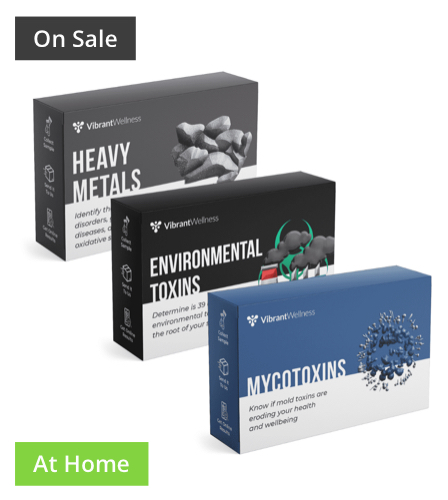
Toxic exposure is a reality of our daily lives, but toxic overload can stress our bodily systems and manifest in various ways. Toxins can lead to elevated oxidative stress and increase demand on the body’s detoxification pathways, particularly in the liver. When the liver can’t adequately eliminate toxins or infectious byproducts, these toxins can clog up normal detox pathways and lead to a range of chronic inflammation symptoms. Total Toxin Burden Test measures 20 heavy metals, 29 mycotoxins, 39 environmental toxins.
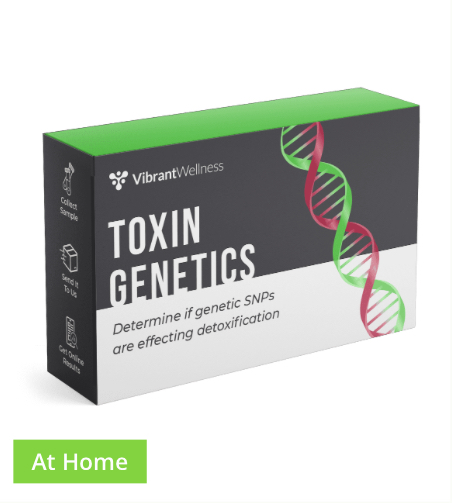
Genetic variations, known as single nucleotide polymorphisms (SNPs), can affect an individual’s ability to detoxify mycotoxins effectively. Identifying these genetic factors can inform tailored interventions to enhance detoxification pathways.
Conclusion
Mold and mycotoxins are often overlooked yet profoundly impactful contributors to chronic symptoms and complex disease dynamics. Their ability to disrupt immune function, reactivate latent infections, and impair multiple body systems makes them a critical focus in any functional medicine approach. Although removing exposure is essential, it is not sufficient on its own. Mold does not simply leave the body without intentional, targeted detoxification. This process must be personalized and strategic to effectively clear mycotoxins from the system.
Moreover, once mold has laid the groundwork for physiological imbalances and disease processes, it’s equally important to address the broader terrain it has disrupted. This typically involves restoring and optimizing core pillars of health—gut integrity, hormone balance, digestive function, detox pathways, immune resilience, and cellular energy production. By addressing both the root causes and their systemic effects, we create the conditions for true and lasting healing.
If you suspect mold exposure may be affecting your health or have any imbalances or disease dynamics, I invite you to join my life-transforming functional medicine program. This personalized approach is tailored to your unique health history, symptoms, and goals—and includes the option for advanced testing like Vibrant’s Mycotoxins, Total Tox Burden panel to uncover hidden root causes. Together, we’ll work to reverse the disease dynamics and restore vitality, energy, and wellness—both in your body and your brain.

As a Certified Functional Medicine Practitioner my Expertise Encompasses:
- Immune System: frequent illness, UTIs, yeast infections
- Allergies, Asthma
- Skin Problems: acne, cystic acne, rosacea, dermatitis, ichthyosis, psoriasis, vitiligo, melasma
- Inflammation: arthritis, rhinitis, joint & muscle pain, migraines, headaches
- Sleep Problems, Insomnia
- Gut Problems: IBS/IBD, bloating, acid reflux, gas, constipation, diarrhea, parasites, fungal/yeast overgrowths
- Hormonal Imbalances: PCOS, PMS symptoms, weight problems/inability to lose weight, thyroid problems
- Hair Loss, Alopecia
- Sleep problems/Insomnia
- Mood Imbalances: anxiety, depression, irritability
- Metabolic Dysfunction, Type 2 Diabetes
- Optimizing Wellness for Successful Pregnancy
- Autoimmune Conditions
- Bone Health: osteopenia/ osteoporosis
- Effective Anti-Aging Strategies without Injectables with the inside-out & outside-in approach
- Detoxification of Heavy Metals, Mycotoxins, Environmental Toxins
- Reversing Breast Implant Illness
- Preparation for the Explant Surgery and Optimization of Wellness & Vitality Post-Explant
DISCLAIMER:
Information and content on this website is provided for information and educational purposes only, and is not intended as a substitute for the advice provided by your physician or other healthcare professional. No information offered here should be interpreted as a diagnosis of any disease, nor an attempt to treat or prevent or cure any disease or condition.
If you have any concerns or questions about your health, you should always consult with a physician or other healthcare professional. Do not disregard, avoid, or delay obtaining medical or health-related advice from your healthcare professional. Always speak with your healthcare professional before taking any medications or supplements.
Information provided on this website does not create a doctor-patient relationship between you and any professional affiliated with this website. Information and statements regarding dietary supplements have not been evaluated by the Food and Drug Administration and are not intended to diagnose, treat, cure or prevent any disease.
I am not acting in the capacity of a doctor, licensed dietitian-nutritionist, therapist, or psychologist and will not diagnose, treat or cure any disease, condition or other physical or mental ailment of the human body. Rather I serve as a mentor and guide who helps a client to reach her/his own health and wellness goals through implementing incremental, positive, healthy, sustainable lifestyle changes that help the client to live and thrive using simple methods.
